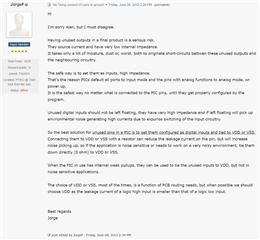I'm still have same leakage when sleeping and have new info.
I recently read on a different forum below that setting unused ports as outputs = 0 internal resistor enabled can still allow leakage through moisture or debris picked up from nearby pins. They recommend setting the unused ports as Inputs and connect to ground (or Vcc even better they claim) through a resistor or directly.
Has TI or anyone experienced this? Details are on a related question that closed, not sure if referenced here. Only change is that we removed the external crystal, internal was fine, so it's not that.
I'd hate to have to try another separate pcb without some confirmation, so if anyone has any ideas. Been going on for years and I have a full reel of these and the larger sister 430.
I also wouldn't be surprised if I'm part of the problem as I'm having to hand solder for now. I pre-solder both the board and pads so it floats slightly while it aligns on a hotplate with hot air above. Possibly the extra solder is amplifying this effect due to possible tighter pin to pin gaps? I wash in baking soda and plain soap/nylon brush, then air dry (Az).
Thanks, I'm all ears ;)



